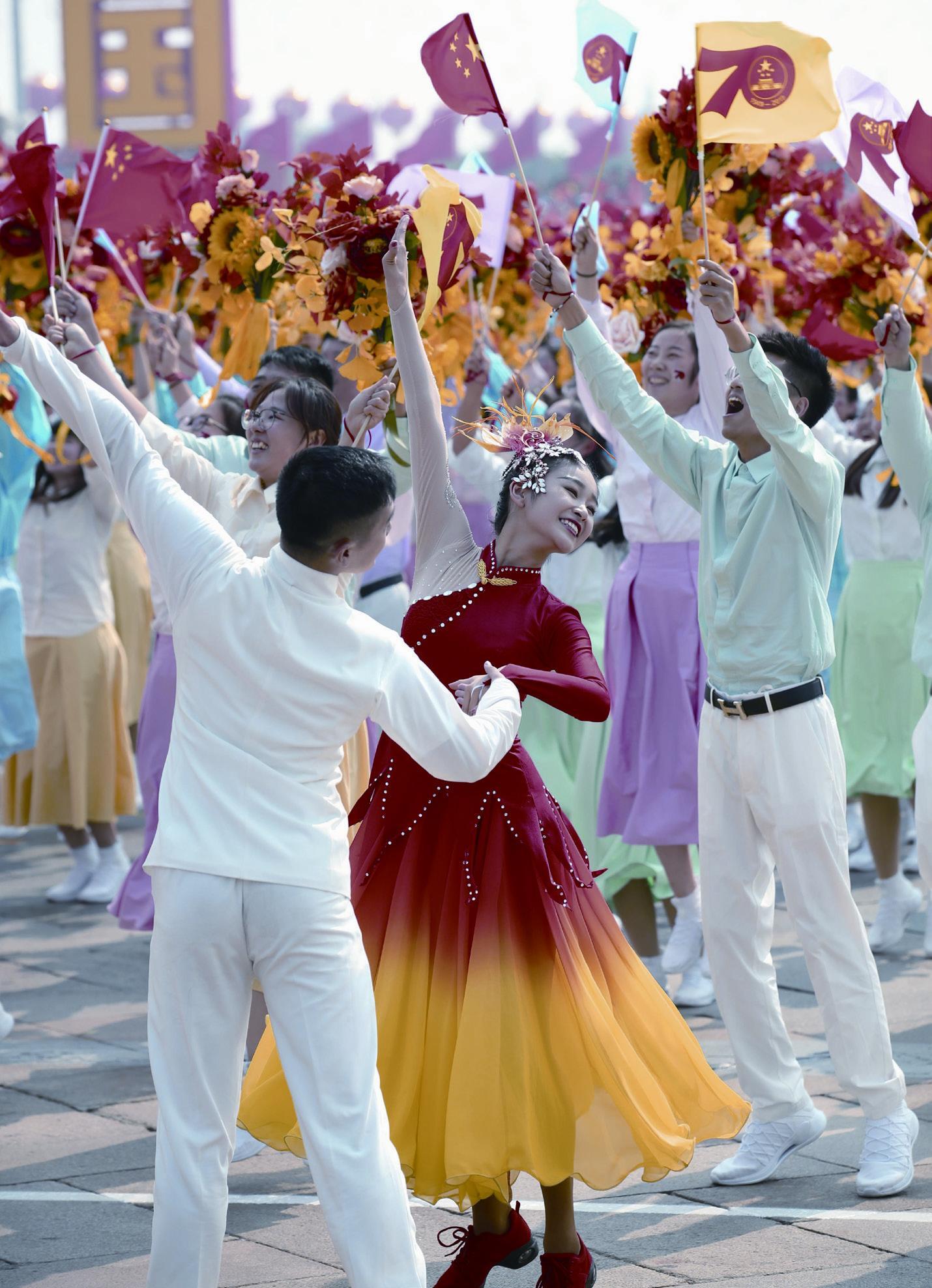PRIDE AND PLEDGE
By Wen Qing

‘My country and I are so in- tertwined that we cant be separated for a moment.”This was a line from the song My Motherland and Me heard often during the celebrations of the 70th anniversary of the founding of the Peoples Republic of China (PRC), expressing the prevailing national mood of pride and joy.
When Mao Zedong declared the birth of the PRC to the world from Tiananmen Square on October 1, 1949, it was a signal that the Chinese people had stood up from the poverty, weakness and humiliation they had suffered for more than 100 years and the journey to national rejuvenation had begun.
Seventy years later, when President Xi Jinping stood in the same place on the same day and emphasized that no force can under- mine Chinas status or stop the Chinese people and nation from marching forward, there was thunderous applause, both from the tens of thousands of people at the ceremony and the hundreds of millions more watching the live broadcast from different places.
“I couldnt help but cry when I heard these sentences,” a popular blogger known as Naodong wrote on Chinese social media platform Weibo.
The post triggered a fl ood of responses. “I am so proud and cannot hold back my tears,”wrote a netizen. “What a coincidence! I cried, too!” said another. “It is so touching! Happy 70th anniversary, my country,” responded yet another.
Source of confidence
According to Zhong Jun, a professor with the Chinese History Research Institute of the Chinese Academy of Social Sciences, the Chinese people feel proud because todays China is strong enough to defend itself against external threats and keep moving forward despite foreign pressures. “This pride is based on the achievements we have made over the past seven decades,” Zhong said.
While 70 years are but a fl eeting moment in human history, they ushered in epoch-making changes in China and for the Chinese people. According to the National Bureau of Statistics, Chinas GDP surged from $30 billion to $13.61 trillion from 1952 to 2018. Today China is the second largest economy and the largest trader in goods. The average life expectancy has risen from 35 to 77 years.
High technology is an important barometer of a countrys comprehensive strength. “When the PRC was founded, Chinas science and technology development was at least 100 years behind Western developed countries,” said Wu Mingyu, a former technology policymaker. But today, China is a leader in technology. The fl oats during this years mass pageant in Tiananmen Square in Beijing on October 1 displayed some of its hi-tech innovations, such as models of Fuxing, the worlds fastest bullet train, FAST, the largest radio telescope, and Tiangong-1, the fi rst domestic space lab launched in 2011.
Honoring heroes
Cheng Shuyu was a participant in the mass pageant on October 1. She came to represent her father, Cheng Kaijia, holding the senior Chengs portrait aloft while sitting on a parade bus which slowly drove through the square, receiving tributes from the crowd.
Nuclear physicist and engineer Cheng Kaijia was one of the founding fathers of Chinas nuclear arms development for deterrence. He left his work in the UK, returned to China and dedicated his life to the Two Bombs, One Satellite project in the early period of the PRC. Two bombs refer to the atom bomb and the intercontinental ballistic missile, while one satellite refers to developing artif ciial satellites. Cheng Kaijia made substantial contributions to safeguarding the PRCs security.

Along with Cheng Kaijia, the founding fathers of the PRC, war veterans and other scientists who made remarkable contributions were also honored during the celebration. They included the first premier of the PRC, Zhou Enlai, and the fi rst minister of health, Li Dequan, who was the wife of Feng Yuxiang, a military hero in the fi ght against the Japanese invasion.
Remembering and saluting national heroes was an important part of the mass pageant. Xi started his address remembering the countrys revolutionary forefathers and martyrs for their feats in pursuing national independence and liberation, a stronger and more prosperous country and the peoples well-being.
In the 1840s, China descended into chaos due to foreign invasions and internal confl icts. But after struggles by generations, the subjugation by Western powers was ended, Japanese aggression defeated, and the PRC was established in 1949.
From the dire poverty back then to becoming the second largest economy today with sufficient military strength to defend its territory, China has completed an arduous journey spurred by the dedication and contribution of many, whose sacrifice and contribution has never been forgotten.
On September 29, Xi presented nationa medals and honorary titles, the highest state honors, to 36 Chinese and six foreign individuals to acknowledge their contributions to the countrys growth.


